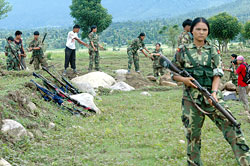|
|
This past week, as street fury over the fuel price hike brought the capital to a standstill, Kathmandu was still full of seminars and workshops on constitutional reform and state restructuring. Scores of articles and op-eds too were published on the same issues.
Also in this one week alone, numerous reports appeared about intimidation and threats. One story headlined Maoist taxation in Dhanusha, another a murder in Bardiya, yet another reported the capture of government officials in Bara. None of these stories mentioned the word 'militia', but anyone with more than cursory knowledge of the Maoists knows it is fear of their militia that is fuelling Maoist expansion.
In the four months of the peace process, the Maoists have moved in from the jungles and expanded their way into all sectors, particularly trade unions and civil society. They now appear entrenched not just in the countryside, where they have roamed freely for years, but also in towns and cities. This is from where their 'non-violent' civil protests are going to come from, if regular Maoist warnings are to be believed. But the activity of our media, civil society, parties, NGOs, INGOs, and donors shows that they are all focused on constitutional polls, rather than on reclaiming political space.
While the nation looks ahead towards constituent assembly elections to find a durable solution to the conflict, the reality on the ground is shifting in the Maoists' favour. The rebels are once again proving adept at using Mao's old dictum: take one step back and two steps forward. If agreeing to a peace process was a step back from their eventual goal, then the expansion of the last four months can be seen as a double leap ahead.
This raises a simple question: What is more important today, talking about the constituent assembly election or working to actually make it happen?
Conventional wisdom today is that Nepal's peace process can only be institutionalised through a new constitution written by an elected constituent assembly. But here is the catch: how do we hold a free election when militia activity reinforces a culture of fear? The focus on polls is fine as long as that is our overarching goal and we concentrate on the tactics of making it a reality. And that means zeroing on potential spoilers such as militia weapons.
But no one is even talking openly about the militia yet, focused as they are on the Nepal Army and the PLA. The PLA, however, was not an instrument of terror but of force projection. The militia is the instrument through which the Maoists have always struck fear. Logically, the focus should now be shifting towards the militia. Perhaps that will happen in time, but public discourse so far does not suggest so, dominated as it is by a new state structure under a new constitution. This assumes that constituent assembly polls will be held. But what if they aren't, or are pushed back indefinitely? Worse still, what if elections are held, but are deemed un-free and illegitimate?
These worst-case scenarios could emerge if the militia issue is not handled properly, and fast. No elections will be free and fair until the militia are removed from the scene. And without an election, there won't be a constituent assembly or a new constitution. We might as well forget about re-structuring Nepal towards a more inclusive democracy.
Removing the militia is certain to be problematic because the Maoists do have legitimate concerns about army-backed vigilante groups and state security organs which, until four months ago, they were fighting. Without a credible guarantee and proper incentives, just asking them to remove the militia won't get us anywhere.
This points to the complete lack of trust between all sides in this troubled peace process. The SPA government lacks control over the army, which makes the Maoists suspicious about army and police intentions, which fuels their militia activity, which is perpetuating a climate of fear. Breaking this vicious cycle will require patient trust-building between all sides, a task the UN will need to demonstrate it is capable of handling.




